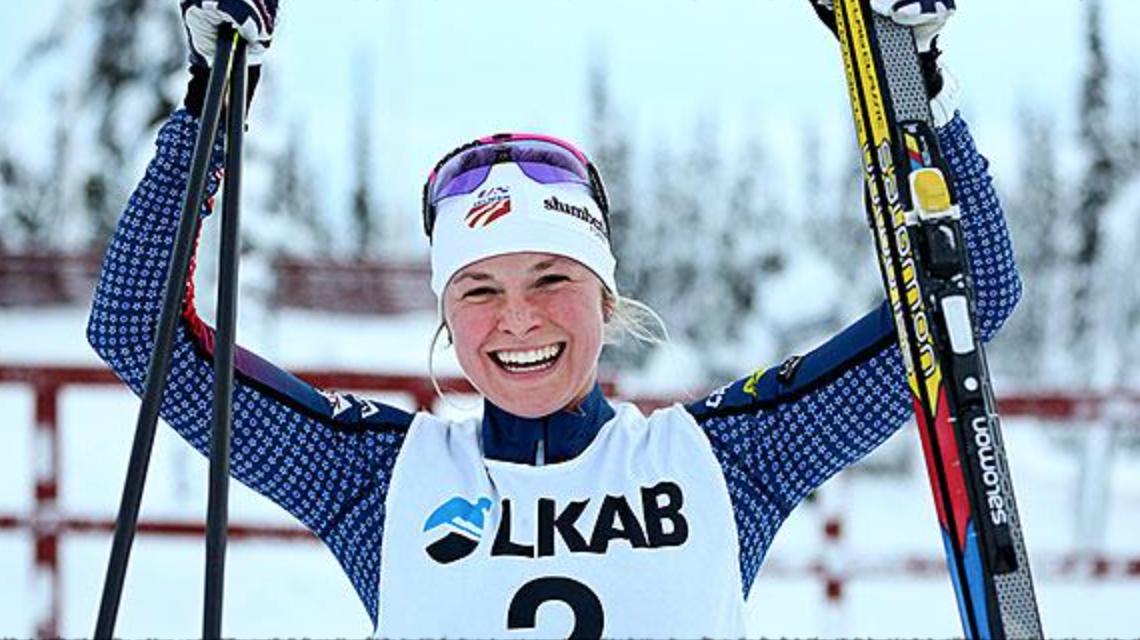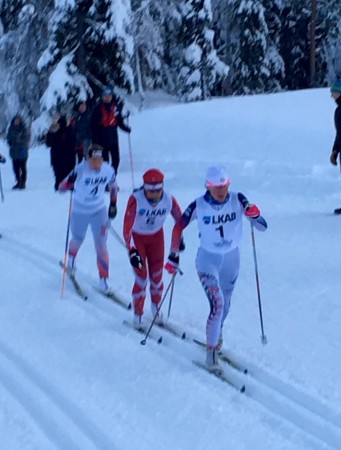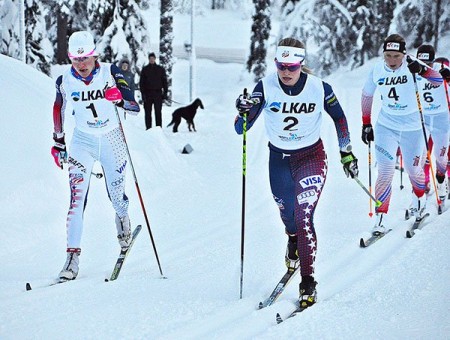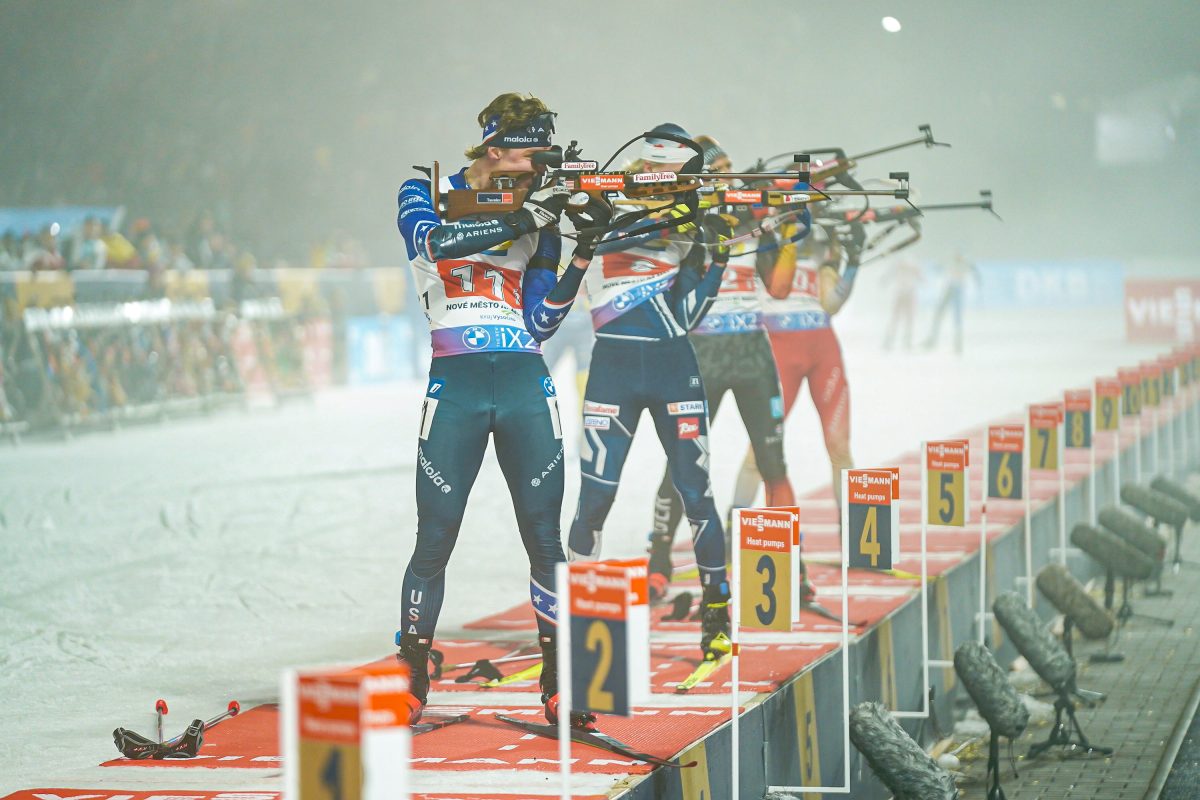
Far north, beyond the Arctic Circle in Gällivare, Sweden, the U.S. Ski Team had its first race of the season. As part of a pre-World Cup FIS race series, the women began with a 1.2-kilometer classic competition on Saturday.
All things considered, it was mission accomplished. Diggins won the sprint final just a length ahead of U.S. Ski Team and Stratton Mountain School (SMS) T2 teammate Sophie Caldwell in second (+1.37). A Czech Olympian and World University Games sprint medalist, Karolina Grohova, finished third (+1.47).
Yet, the women’s field in Gällivare is on the thin side, with just 17 racers finishing the qualifier. That meant that everyone automatically made quarterfinals; absent from these races are top skiers from the usual podium suspects: Norway, Sweden, Germany, and Finland.
“I definitely expected a couple of podiums today for the women,” U.S. Women’s Coach Matt Whitcomb said in an interview. “But I wasn’t sure of what sort of performances to expect. This first week is always sort of a wild card with people adjusting to more quickly than others.”
Caitlin Gregg placed seventh, just missing the final, and Liz Stephen ninth. Both raced in the semifinals.

Asked why the team chose Gällivare as the tune-up rather than races with a more stacked women’s field — for instance, Bruksvallarna, elsewhere in Sweden — Whitcomb explained that a touchy snow situation in Europe in the past few weeks made planning more difficult for both the U.S. and other teams, and that snow is a bigger priority than the races themselves.
“The priority is on finding the best snow for this week as we adjust,” he said. “The number one goal for this week is to have a great on-snow training camp. The conditions are blue hard wax skiing and wearing gloves without freezing your fingers.”
Despite the good snow and mild weather — race temps hovered around -5 degrees Celsius (23 Fahrenheit) — early season racing can be about nerves.
“I was the one running around the start pen cracking jokes and waving hi to everyone, because that’s how I deal with it,” Diggins said in a post-race phone interview. “A lot of people think that’s me not being nervous. But that’s me getting ready to race.”
That nervous energy was channeled into forward momentum from the go; the first taste of international competition for the U.S. women, a success. That began right away during qualification.
Caldwell qualified the fastest, in 3:00.25, nearly four seconds ahead of Diggins in second (+3.95). Canada’s Emily Nishikawa qualified fifth (+9.91).
“Seeing the results confirmed that I felt really good for the race and I was definitely surprised to have won the qualifier by that much,” said Caldwell over the phone. “I wanted to give the qualifier a really good effort like I would on the World Cup, because I think it’s a really good practice race for next weekend.”
She set herself up for a smooth transition from the qualifier, through the quarters, and into the semifinals.

There, the competition became a little stiffer. Caldwell won her semifinal heat, beating Canada’s Nishikawa by a ski length.
Through her qualifier and heats, Diggins maintained she could feel her summertime training and technique drills pay off.
“This summer I’ve been working on my power striding,” she explained. “Just working on those long smooth strides and just not being frantic. And this course really suited that. I focused on setting my wax pocket and using my power.”
Diggins advanced to the finals, winning her semifinal by 2.34 seconds over Norway’s Anna Svendsen. That set her on a crash course with Caldwell and Nishikawa.
Diggin’s strategy for the final was to ski to the front right away and hold it, since passing on the twisting course remained tough.
“When we were 40 seconds from the stadium, I knew I had a good chance to win it because there was no way to get around,” said Diggins.
“I wanted to try following- I didn’t want to lead out of the start,” said Caldwell, about her finals strategy. “Because I had led my first two [heats] and it’s generally faster to follow,”
Caldwell decided to shadow Diggins.
“Even if I had led out the first part, [Diggins] is good at the downhills and double poling. I figured she would be able to make up anytime catching me on the double pole section.”
With a small gap before the finish, the duo hammered into a downhill, gaining speed. Cadwell tucked in behind Diggins for the remainder of the race. Diggins double pole strength outdistanced Caldwell by just over a second at the finish.
Beyond the win, Diggins believes hers was also a psychological victory. Diggins says she’s becoming more confident about being a complete World Cup racer, not only a world class skate skier.
“I want to walk up to the startline of a classic race with that same confidence in myself that I have at the start of every skate race,” explained Diggins.
Whitcomb thinks that’s definitely coming.
“It’s the best I’ve seen Jessie classic sprint ever,” he said. “It gives us a big boost as we move into the World Cup season next week.”
The small women’s field didn’t take anything away from his enthusiasm about the results: with Andy Newell in second, the team had also had success in the men’s race.
“I don’t care if it’s a World Cup or a local club race. Today, having three of the six podiums was just a lot of fun,” said Whitcomb.
The race venue, with smaller fields on the women’s side, was also a time for the U.S. service team to gel. Whitcomb says Saturday offered relatively straightforward waxing. That’s noteworthy.
“Our service staff has four new faces on it for this period one of racing. Three are full time staff members that we’ve added this year. To see this crew operating as seamlessly as they did was a really good feeling today.”
Racing will continue on Sunday with a 10 k skate competition.
Jason Albert
Jason lives in Bend, Ore., and can often be seen chasing his two boys around town. He’s a self-proclaimed audio geek. That all started back in the early 1990s when he convinced a naive public radio editor he should report a story from Alaska’s, Ruth Gorge. Now, Jason’s common companion is his field-recording gear.



